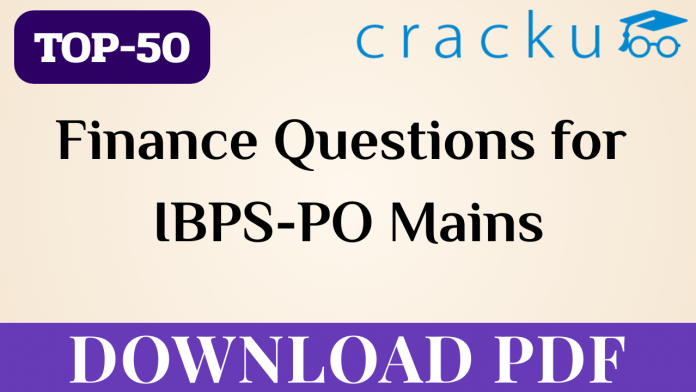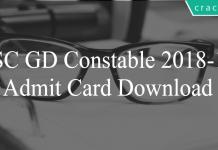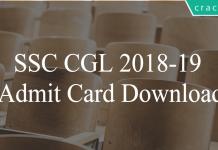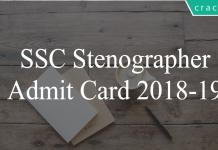TOP-50 Finance Questions for IBPS PO Mains
Download important Finance Questions PDF based on previously asked questions in IBPS PO and other Banking Exams. Practice these Question and Answers for IBPS PO Exam.
Download IBPS-PO Mains TOP-50 Finance Questions PDF
Take 4 Free mock tests for IBPS PO
Download IBPS PO Previous Papers PDF
Read this Post in Hindi
Question 1: Advance received from customer is
a) an item of current liability
b) an item of non-current asset
c) an item of contingent liability
d) an item of non-cash cost
Question 2: ‘Causa Proxima’ implies that the loss must arise from
a) The nearest place
b) An ascertainable source
c) The cause insured against
d) Unforeseen against
Question 3: In the terms of economics, the recession occurring two times with a small gap in between is known as ______
a) Double Deflation
b) Deflation
c) Deep Recession
d) Double Dip Recession
e) None of these
Question 4: The demand for labour is called
a) direct demand
b) derived demand
c) factory demand
d) market demand
Question 5: At present, India is following which kind of exchange rate?
a) Fixed exchange rate
b) Floating exchange rate
c) Pegged up exchange rate
d) Pegged down exchange rate
Question 6: What is the exemption limit of tax for citizens below 60?
a) 2.5 lakhs
b) 3lakhs
c) 3.5lakhs
d) None of the above
Question 7: DICGC insurance cover is headed by?
a) Tata Group
b) Central Government
c) Reliance Group
d) None of the above
Question 8: Under which market condition do firms have excess capacity ?
a) Perfect competition
b) Monopolistic competition
c) Duopoly
d) Oligopoly
Question 9: Mutual funds is regulated by ?
a) IRDA
b) TRAI
c) SEBI
d) None of the above
Question 10: Who is the Chairman of Tax Administration Reform Commission (TARC)?
a) S S Mundra
b) H R Khan
c) Parthasarathi Shome
d) None of the above
IBPS PO Previous Papers (Download Pdf)
Question 11: Social accounting system in India classified into is
a) enterprise, households and government
b) assets, liabilities and debt position
c) public sector, private sector and joint sector
d) income, product and expenditure
Question 12: The 12th Five Year Plan will be operative for the period
a) 2010 – 2015
b) 2011 – 2016
c) 2012 – 2017
d) 2013 – 2018
Question 13: Who has observed that ‘’An office system means a network of procedures integrated and designed to carry out a major activity’’?
a) Henry Fayol
b) George Terry
c) O’Donnel
d) Gulshan
Question 14: What does net working capital stand for ?
a) Fixed assets minus current assets
b) Fixed assets minus current liabilities
c) Current assets minus current liabilities
d) Noncurrent liabilities minus current assets
Question 15: A company’s auditor is expected to give
a) A critical review of accounts
b) His expert opinion about the accounts
c) A factual position about the accounts
d) All of the above
Question 16: Closing stock is valued at cost or market price, whichever is
a) Higher
b) Lower
c) Convenient to the management
d) Appealing to the accountant
Question 17: Which is the biggest tax paying sector in India?
a) Agriculture sector
b) Industrial sector
c) Transport sector
d) Banking sector
Question 18: ‘Economics is what it ought to be’ – This statement refers to
a) Normative economics
b) positive economics
c) Monetary economics
d) Fiscal economics
Question 19: The terms ‘Micro Economics’ and ‘Macro Economics’ were coined by
a) Alfred Marshall
b) Ragner Nurkse
c) Ragner Frisch
d) J.M. Keynes
Question 20: During periods of inflation, tax rates should
a) increase
b) decrease
c) remain constant
d) fluctuate
IBPS PO Previous Papers (Download Pdf)
Question 21: The excess of price a person is to pay rather than forego the consumption of the commodity is called
a) Price
b) Profit
c) Producers’ surplus
d) Consumer’s surplus
Question 22: What is the tax free limit for home loan for budget?
a) Rs. 2 lakh.
b) Rs. 3 lakh
c) Rs 5 lakh
d) None of the above
Question 23: The national income of a nation is the
a) Government’s annual revenue
b) Sum total of factor incomes
c) Surplus of public sector enterprises
d) Exports minus imports
Question 24: The process of purposeful and deliberate manipulation of information by the sender which is to be passed to the receiver is called?
a) Articulating
b) Generalizing
c) Stereotyping
d) Bypassing
e) Filtering
Question 25: What does “M” stand for in the SMART approach for setting objectives to be achieved by the employees?
a) Monetary
b) Marketable
c) Manageable
d) Measurable
e) Multipurpose
Question 26: Whatis India’s rank in the World Bank’s Human Capital Index (HCI) rankings as of Feb 2019?
a) 124
b) 115
c) 126
d) 104
Question 27: What does F stand for in FRBM Act?
a) Financial
b) Funds
c) Forward
d) Fiscal
e) Foreign
Question 28: A temporary account maintained by a third party( generally Bank) during the process of transaction between the two Parties?
a) Current Account
b) FCNP Account
c) ESCROW Account
d) EEFC Account
e) RFC Account
Question 29: What does “I” Stand for in FRDI Bill which has been in news recently?
a) Information
b) Insolvency
c) Insurance
d) Investment
e) Industrial
Question 30: Shares of a company issued to the existing shareholders at a special discounted price less than the future stated market price are called?
a) Discount Shares
b) Preference Shares
c) Rights Issue
d) Invitation Shares
e) Special Drawing Rights
IBPS PO Previous Papers (Download Pdf)
Question 31: What is the type of Knowledge that is difficult to transfer to another person by merely writing it down or verbalizing it?
a) Explicit Knowledge
b) Tacit Knowledge
c) Anchored Knowledge
d) Implicit Knowledge
e) Systemic Knowledge
Question 32: The Debt Security that doesn’t pay Interest and is issued at a deep discount to its face value is called?
a) YTM Bond
b) Discount Bond
c) Coupon Bond
d) Zero Coupon Bond
e) None of the Above Options
Question 33: Price theory is also known as
a) Macro Economics
b) Development Economics
c) Public Economics
d) Micro Economics
Question 34: To disburse short term crop loans to the small and marginal farmers, RRB Credit Refinance Fund is being set up by
a) RBI
b) SEBI
c) NABARD
d) FICCI
e) Union Ministry of Finance
Question 35: Formalised system of trading agreements with groups of countries is known as
a) Trading blocks
b) Trade ventures
c) Trade partners
d) Trade organizations
Question 36: The purchase of shares and bonds of Indian companies by Foreign Institutional Investors is called
a) Foreign Direct Investment
b) Portfolio Investment
c) NRI Investment
d) Foreign Indirect Investment
Question 37: Disinvestment in Public Sector is called
a) Liberalisation
b) Globalisation
c) Industrialisation
d) Privatisation
Question 38: The exchange of commodities between two countries is referred as
a) Balance of trade
b) Bilateral trade
c) Volume of trade
d) Multilateral trade
Question 39: Pre shipment and post shipment is related with which finance?
a) Housing Finance
b) Export finance
c) Agricultural Finance
d) None of the above
Question 40: Which statutory organization regulates insurance sector in India?
a) IRDA
b) SEBI
c) IBPS
d) None of the above
IBPS PO Previous Papers (Download Pdf)
Question 41: How is BSE given trade facility?
a) Offline
b) Inline
c) Outline
d) Online
Question 42: India recently signed Double Taxation Avoidance Agreement (DTAA) with _____ to prevent income tax evasion by entities in both the countries.
a) Lativa
b) Belgium
c) Argentina
d) Switzerland
e) Mauritius
Question 43: In order to attract more foreign exchange the Govt. of India decided to allow foreign investment in LLP firms. What is full form of “LLP” as used in this reference?
a) Local Labour Promotion
b) Low Labour Projects
c) Limited Loan Partnership
d) Longer Liability Partnership
e) Limited Liability Partnership
Question 44: MTSS is used as?
a) Tax return
b) Tax benefit
c) Personal remittance
d) None of the above
Question 45: Market price is also known as
a) List price
b) Value price
c) effective price
d) retail price
e) wholesaler price
Question 46: As per the Income Tax laws in India, the maximum amount not liable to tax in case of an individual aged 60 years and above is
a) ` 150000
b) ` 180000
c) ` 200000
d) ` 250000
e) ` 300000
Question 47: The factor that least influences exchange rate fluctuations:
a) Industrial Production
b) Investor sentiments
c) Interest Rates
d) Consumer Price Index
e) Goods and Service Tax
Question 48: What will Inflation result in ?
a) Decrease in prices
b) Increase in quality of life
c) Decrease in economic activities of a country
d) None of the above
Question 49: When there is a difference between all receipts and expenditure of the Govt. of India, both capital and revenue, it is called.
a) Revenue Deficit
b) Budgetary Deficit
c) Zero Budgeting
d) Trade Gap
e) Balance of Payment Probelm
Question 50: What is the maximum deposits amount insured by DICGC?
a) Rs.2,00,000 per depositor per bank
b) Rs.2,00,000 per depositor across all banks
c) Rs.1,00,000 per depositor per bank
d) Rs.1,00,000 per depositor across all banks
e) None of these.
Answers & Solutions:
1) Answer (A)
2) Answer (C)
3) Answer (D)
4) Answer (C)
5) Answer (B)
6) Answer (A)
7) Answer (B)
8) Answer (B)
9) Answer (C)
10) Answer (C)
11) Answer (C)
12) Answer (C)
13) Answer (B)
14) Answer (C)
15) Answer (B)
16) Answer (B)
17) Answer (B)
18) Answer (A)
19) Answer (C)
20) Answer (A)
21) Answer (C)
22) Answer (A)
23) Answer (B)
24) Answer (E)
25) Answer (D)
26) Answer (B)
27) Answer (D)
28) Answer (C)
29) Answer (C)
30) Answer (C)
31) Answer (B)
32) Answer (D)
33) Answer (D)
34) Answer (C)
35) Answer (A)
36) Answer (D)
37) Answer (D)
38) Answer (C)
39) Answer (B)
40) Answer (A)
41) Answer (D)
42) Answer (A)
43) Answer (E)
44) Answer (C)
45) Answer (C)
In economics, market price is the economics price for which a good or service is offered in the marketplace. It is of interest mainly in the study of microeconomics. Market value and market price are equal only under conditional of market efficiency, equilibrium and rational expectations.
46) Answer (D)
47) Answer (D)
48) Answer (C)
49) Answer (A)
50) Answer (D)





